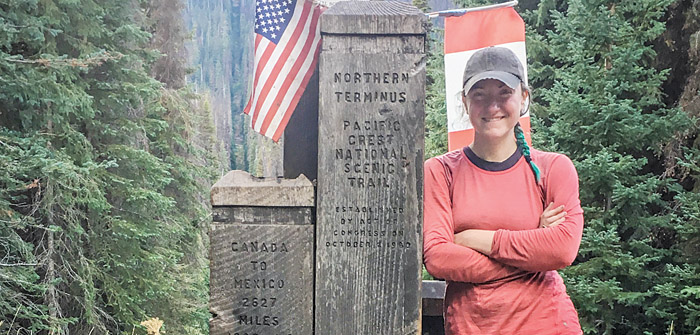(Next Mile Meals founder and owner Jessie Greger at the completion of her 2,650-mile Pacific Crest Trail hike | Photos courtesy of Next Mile Meals)
In 2017, Jessie Greger found herself at mile one of the Pacific Crest Trail, about to begin a 2,650-mile trek from Mexico to Canada. “That’s not a unique story: it’s a trail that thousands attempt each year and a few hundred complete successfully,” explains Greger. “My diet, however, was unique. I completed the hike ketogenically, which had not been done before. In my daily life, a keto lifestyle means a diet extremely low in carbs and sugar, which is fundamentally not possible with conventional trail food. A thru-hiker’s staples are rice, pasta, potatoes and candy bars, and these were all off-limits to me.”
Since Greger was unable to find any meals in stores that met her nutritional needs, she decided to make her own. “I designed six hand-made, carefully crafted meals that withstood the ultimate trail test: I ate them every day for five months, through three states, and through a successful thru-hike.” When the hiking community heard that there was a ketogenic thru-hiker who had completed the Pacific Crest Trail (PCT), Greger says people came out of the woodwork to ask her how she had done it, and if they could do the same.
So together with her partner, Christopher — who carefully packaged each meal and then shipped the meals to Greger along the trail — Next Mile Meals was launched the following year in 2018, offering the first low-carb, ketogenic freeze-dried meal for hikers, backpackers and campers. “Not only does this make the outdoors more accessible to hikers with food limitations, these meals also just taste great,” says Greger, founder and owner of the company. Next Mile Meals are also gluten-free and absent of most allergens, she says, although the majority of her customers are not keto and eat an unrestricted, conventional diet. “They just prefer our product’s healthy ingredients and great taste. When you cut out the processed starches, you’re left with meals made entirely out of healthy proteins, interesting spices and colorful veggies. Who doesn’t prefer a meal like that?”
From 2018 through early 2020, Next Mile Meals was based in the Bay Area of California, in a licensed shared commissary kitchen with a few part-time staff members. “We never intended on being a big brand, never wanted to compete with the goliaths in the industry who put $.05 cents of pasta in a bag and sold it for $7. We made small batches, by a small team, in a small kitchen, and we loved it.”
When 2020 hit, Greger says everyone realized that hiking and camping were the ultimate social- distancing activities, and some of the larger brands in the industry saw a 1,000+ percent increase in sales year over year, and many couldn’t keep up. “As customers couldn’t find their regular chili mac in big box stores, they began to try new channels, like e-commerce, and new brands like ours,” she says. “Our sales skyrocketed, and we stocked out within an hour every time we had a new batch go live on our site. These new customers stuck around, and our return customer rate also skyrocketed.”
This increase in demand, however, meant that many of Next Mile Meals suppliers couldn’t keep up, Greger says, so many decided to cut their customer list and just focus on their largest clients. “As small as we were, we often didn’t make the cut. 2020 was spent rebuilding our supplier list from scratch, which often required doubling or tripling our minimum order quantities just to be considered.” She adds, “We went from purchasing 1,000 pounds of ground beef in each PO to placing orders for 10,000 pounds overnight, just to keep our supply chain undisrupted.”
With the larger purchase orders, the need for a bigger space arose for Next Mile Meals. “With the increased sales came increased kitchen rental costs, and we were going to have to start hiring full-time staff to keep up,” says Greger. “So we looked around and thought, ‘is this city really where we want to be long term?’”
During Greger’s 2017 hike, she and her fellow hikers were on the stretch of the PCT that passes through Central Oregon and were kicked off trail due to the wildfires raging through the Three Sisters and Jefferson wildernesses at that time. “We came to Bend to nurse our aching feet, cry frustratedly about the wildfires and plan how to get back to trail,” she says. “While we were here for that week, we found ourselves looking around and saying, ‘Wow, this town is fantastic.’”
As Greger and her hiking partners returned home to California after their hike and began to launch and grow Next Mile Meals, she says they always had Bend in the backs of their minds, thinking that one day, they would want to leave the Bay Area and live closer to the hiking and trails they loved. “We thought that one day, this tiny company of ours would need a real home, and what better place than a home surrounded by other like-minded, outdoor-industry companies that we can learn from, network with and share successes with?”
In the summer of 2020, as the Next Mile Meals team was looking around and evaluating their next big leap, Greger says they knew that their “one day” had arrived. “We packed up our tiny warehouse, said goodbye to our small commissary kitchen and left the city we’d lived in for more than ten years.”
Next Mile Meals now has a facility on 4th Street in Bend that is undergoing its final plumbing and building upgrades for Oregon Department of Agriculture approval, and Greger says the plan is to begin hiring new staff for both administration and manufacturing in early 2022.
“In the Spring of 2017, I was told there was no way I could thru-hike the PCT on a keto diet, that I ‘won’t make it 100 miles.’” She proved the naysayers wrong, and in the Spring of 2021, Backpacker Magazine named Next Mile Meals “Best Backpacking Meal.” The meals were named best in all categories, Greger adds, not just in the keto category. “In the Spring of 2022, our new home in Bend will officially open its doors, and our next chapter will begin,” she says. “And we can’t wait.”




